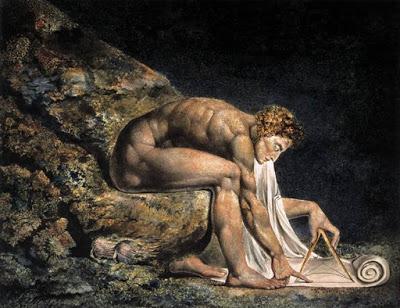
Isaac Newton by William Blake
“The good thing about science is that it’s true whether or not you believe in it.” –Neil DeGrasse Tyson, American astrophysicist, author and communicatorIn this era of “alternative facts” that quote from Neil DeGrasse Tyson perfectly summed up for me the difference between science and belief. So even though I want to say something today about our approach toward science here at Yoga for Healthy Aging, I’m not going to say we “believe” in it (despite the fact that it was the phrase that first came to my mind.) So let me just put it this way: from our very first day of blogging, Yoga for Healthy Aging has been science based. One of our original founders, Dr. Brad Gibson, is a medical researcher who has specialized in studying aging and age-related diseases, among other things. And our long-time staff member, Dr. Ram Rao, is a neuroscientist, who studies age-related diseases of the brain, such as Alzheimer’s disease. From the get-go, Brad’s scientific knowledge about what is known about aging (and what is not known) has kept us grounded in reality. When we write about aging, we always cite from scientific studies or experts. With scientific evidence to back us up, we can do our best to avoid making unrealistic claims or promises. And we’re constantly checking behind the scenes with both Brad and Ram to make sure we’re on track. Then, if we want to address some aspect of aging that hasn’t been—or can’t be—studied with science, such as our approaches to death and dying, we make it clear we’re talking subjectively about our experiences or the experiences of people we know. Likewise, when we discuss yoga, if there is some scientific study or expert opinion that we can offer to back up our statements, we will provide them. For example, when we discuss the how pranayama interacts with your nervous system, how to trigger the relaxation response with yoga, or what are the many of the beneficial effects of meditation that have been studied, we cite our sources of scientific evidence or medical expertise. In many cases, when we’re talking about the effect of yoga poses on physical health, particularly on our strength, flexibility, balance, and agility, we’re using scientific information about “exercise” in general. That’s because although yoga poses are a special form of exercise to us—especially because we often do them mindfully—they do fall under into the general categories of stretching, strength building, balancing, and agility. But often for yoga there’s no scientific explanation for why it is working, for example, how the wisdom of yoga enriches our lives or the emotional effects specific yoga poses can have on us. In these cases, we make it clear we’re talking subjectively about our own experiences or the experiences of others, or that we’re describing a yoga “tradition.” I think it’s very important for all of us to acknowledge that on any given day we all use a combination of science and anecdotal evidence (conclusions we come to from our own experience or wisdom we’ve gained from others) to make decisions both large and small. For example, when we’re taking a health-preserving medication, using our computer to plan a trip, or deciding not to drive on a Spare the Air day, we’re relying on science. But when we’re deciding to get married or to take a new job, choosing to study yoga with one teacher instead of another, or just selecting a new TV show to check out, we’re relying on our own life experiences and the advice of others who we respect. We just need to make sure we appreciate both and distinguish between the two! “I know of no time in human history where ignorance was better than knowledge.” —Neil DeGrasse Tyson
P.S. Brad wants to add that scientists themselves rely on hunches, limited data, and so on. In fact, they're dependent on these types of anecdotal evidence to direct studies to actually prove something is true, false, or possibly unanswerable. Subscribe to Yoga for Healthy Aging by Email ° Follow Yoga for Healthy Aging on Facebook ° Join this site with Google Friend Connect

